One Life Can Make A Difference
Sermon Preached by Rev. Dr. Marvin McMickle at the Antioch Baptist Church in Cleveland, Ohio
In Memory of John Lewis an C.T. Vivian
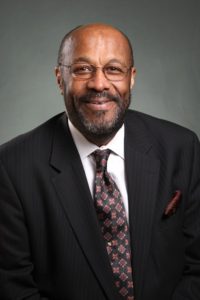
I have been singing the song, We Shall Overcome Someday for the last 54-years. The truth is, I did not think in 1966 that there would be any need to keep singing it more than fifty-years later. I guess I was always emphasizing the words “We Shall Overcome” However, as the years have gone by, I cling to the hope found in the word “Someday.”
I sang that song in the 1960s during marches and demonstrations in Chicago when Martin Luther King, Jr. came there to challenge the segregation in housing which was worse in my hometown than in any other city in the country at that time. I sang We Shall Overcome Someday inside of jail cells in New York City in the 1970s when Ralph David Abernathy, best friend and successor of Dr. King came to challenge major corporations headquartered in NYC about their lack of diversity in management, in their Board of Directors, and in the contracts they issued for one service or another.
I sang that song in the 1980s and 90s when people from this church got on buses and drove to Washington, DC to march for jobs and justice. I sang that song on an airplane with Mylion Waite, Otis Moss, Jr., Stanley Tolliver, and many others from Cleveland when we went to oppose the nomination of Robert Bork to the US Supreme Court. I sang that song in Montclair, NJ when the federal government tried to engage in what it called “Urban Renewal, but what we called “Negro removal.” I sang it in Painesville, Ohio when the KKK held a rally there in preparation for the even bigger rally they were planning for downtown Cleveland.
I have sung that song every year since 1985 at Martin Luther King, Jr. Day national observances. I have sung it inside of Jewish synagogues, Muslim mosques, Roman Catholic cathedrals, on college campuses, at national conventions, at press conferences, in front of police stations, city halls, and congressional offices. I even sang it on April 9, 2018 inside Ebenezer Baptist Church in Atlanta when I was invited to speak at the 50th anniversary of the death and funeral of Dr. King. I have been singing We Shall Overcome Someday since I was 17-years old, and today I have inverted those numbers and gone from being a 17- year-old high school student to a 71-year-old retiree. I really did not think I would need to keep singing this song, but “someday” has not yet fully come.
In my book, The Audacity of Faith, thirty scholars and clergy activists pondered the question of whether the election of Barack Obama was the “some day” we had been singing about and for which we had been waiting. Surely, seeing a black man and his family move into the White House, a house largely constructed by slave labor, surely that was the sin that the United States had finally become a post-racial society. Surely the Dream of Dr. King had been fulfilled. Surely the struggle for civil rights and ended in victory. Surely, we no longer needed to sing “We Shall Overcome Someday.”
Then came the killing of nine black people inside Mother Emmanuel AME Church in Charleston, South Carolina on July 17, 2015 by a 20-year old white supremacist named Dylan Roof who was hoping to start a race war. Then came a march by white nationalists, KKK members, and American Nazis in Charlottesville, Virginia on August 12, 2017 during which Heather Heyer was hit and killed by a car driven by a white supremacist named James Fields. Then came Donald Trump who was elected after Barack Obama in a white backlash, and he commented on that march by saying “there were very fine people on both sides.” Once again, we found ourselves singing We Shall Overcome Someday.
Then came the decision by the U.S. Supreme Court on June 24, 2013 to severely weaken the Voting Rights Act. With Clarence Thomas, who embodies everything that his predecessor Thurgood Marshal stood for and worked for, voting with the majority. The battle against intentional voter suppression was dealt a serious blow. Every act of voter suppression we see in this country today is a result of that court decision seven years ago. Now, less than fifty years later, we found ourselves singing We Shall Overcome Someday.
Then came the Black Lives Matter movement in response to the deaths of one unarmed black person after another at the hands of police. There was Michael Brown whose body was left lying in the street in Ferguson, Missouri after he had been shot by police officer after being accused of shoplifting. There was Eric Garner who was choked to death in New York City by a police officer following a charge of selling cigarettes one at a time. There was Tamir Rice who was shot right here in Cleveland by a white police officer who started shooting within two seconds of his arrival on the scene. The charge was playing with a gun that the police dispatcher said was probably a toy. In response to these events, people kept having to sing We Shall Overcome Someday.
More recently, there was Ahmad Arbury in Georgia who was shot while jogging. There was Breonna Taylor in Kentucky who was shot in a case of mistaken identity. Most grievous of all might be George Floyd in Minnesota who died after three police officers pinned his body to the ground while one of them pressed his knee and the full weight of his body on Floyd’s neck for 8 minutes and 46 seconds. Those events happened this year. 54-years after I first sang We Shall Overcome Someday, and it seems as if someday has not yet arrived in terms of liberty and justice for all.
In light of this history I have just set forth, let me tell you a few things I have learned while singing this song. The first is, I can say “we” shall overcome, because along the way there were some truly extraordinary men and women who sacrificed themselves for the cause of justice. I learned that One Person Can Make a Difference. “We” shall overcome, because men like John Lewis and C.T. Vivian led the way in the battle to turn this country into what they called the Beloved Community. Both of them came from obscurity and rose to national prominence. Both of them were beaten and bloodied in Selma, Alabama as they risked their lives in an attempt to gain voting rights for black people in Alabama and all across this country.
As I wrote in a Facebook post last week, Thomas Jefferson and John Adams, two of our nation’s founders died on the same day, July 4, 1826. Now it has happened again as two of the founders of the modern civil rights movement died on the same day; July 17, 2020. It is impossible for me adequately to put into words the importance of those two men in gaining for us the rights and freedoms we take for granted today. Do you understand that there is a straight line from the march across the Edmund Pettus Bridge in Selma, Alabama on March 7, 1965 to the election of Barack Obama on November 4, 2008.
Do you also understand that Donald Trump won election as President, because black voters in Detroit, Philadelphia, Milwaukee, and Cleveland chose not to vote on Election Day in 2016 because they did not like Hillary Clinton? Do not blame Donald Trump for being who he is and doing what he does. Donald Trump is in the White House not only because of interference from the Russian government. Donald Trump is not in the White House because of voter fraud against black voters. Donald Trump is in the White House, because he won four states in the Electoral College that he should have lost (Pennsylvania , Michigan, Ohio, and Wisconsin). Why did he win those states? Because black people squandered the right to vote that was won for them in Selma, Alabama through the blood and bludgeoning of people like John Lewis and C.T. Vivian.
To be sure, Lewis and Vivian were not the only ones on the battlefield for a better tomorrow. They were led by Dr. King, and joined by Andrew Young, Rosa Parks, Diane Nash, Fred Shuttlesworth, Jesse Jackson, Ralph Abernathy, Wyatt Tee Walker, James Bevel, Hosea Williams, Medgar Evers, Amelia Boynton, Daisy Bates, Bernard Lafayette, Marian Wright Edelman, Thurgood Marshall, Roy Wilkins, James Farmer, Ella Baker, Septima Clark, Viola Liuzzo, James Reeb, and so many others.
If you, and your children, and your grandchildren do not know these names, you should use the rest of this summer to learn about them and about their struggles, their sufferings, and their sacrifices. These people are the reason “we” shall overcome! Each of these people, at some point during the Civil Rights Movement engaged in some singular act of courage in pursuit of justice. At some point, each of them had to step forward and decide to face some great resistance, some risk of physical harm, and even the possibility of death.
That leads me to the second thing I have learned about singing We Shall Overcome, and that is the importance of emphasizing the word “shall.” It speaks of determination. It speaks of persistence. Martin Luther King, Jr. was arrested and sent to jail over thirty times. John Lewis was arrested and sent to jail over forty times. Who would have blamed them if they had decided to give up and walk away? Instead, they just kept singing, We SHALL Overcome.
It was with emphasis on the word SHALL that President Lyndon Johnson introduced the 1965 Voting Rights Act in 1965. I can still hear him with his thick Texas accent saying “and we shall overcome” while looking straight into the camera and straight into the eyes of white members of Congress, many of whom were adamantly opposed to giving voting rights to black people. He knew how hard it was going to be to get that bill passed.
Someone told him in 1965, that if he signed the Voting Rights Act there would be a rush of white people from the Democratic to the Republican Party where they would continue their resistance to racial equality. That is where the notion of “Reagan Democrats” began, white Democrats who did not want to accept the direction of the Democratic Party concerning civil rights. How sad, that when Ronald Reagan was running for President in 1980, he went to Neshoba County, Mississippi where three civil rights workers had been murdered in 1964 to give a speech about state’s rights.
Sometimes the opposition seem too great. The odds may be against us. Power may be lined up on the side of our opponents. But in the words of yet another civil rights song I learned to sing 54-years ago; “Just like a tree planted by the water I shall not be moved.”
That is where our text from I Samuel 17 comes into play. It points to the courage of a single individual in the face of enormous danger and opposition who possesses enough faith and assurance that he was willing to go face-to-face with an enemy of immense size and strength. When none of the soldiers of King Saul were willing to risk their lives by facing the Philistine giant named Goliath, a simple shepherd boy named David said, “I will go and face the danger.”
Allow me to suggest that the main point of this story is not how it ended with the death of Goliath. The main point of this story is not that David won, but that David went to face Goliath in the first place. When neither King Saul, nor his generals, nor any of his soldiers, and not even David’s older brothers would go, David volunteered to “cross the proverbial Edmund Pettus Bridge” and face Goliath who was waiting on the other side. We remember John Lewis and C.T. Vivian today not because they won in Selma on Bloody Sunday in 1965. We remember the because they went up against great odds and faced great danger when winning was still uncertain.
President Theodore Roosevelt wrote these words over 100-years ago, and today I dedicate them to the memory of John Lewis and C.T. Vivian :
The credit belongs to the man who is actually in the arena, whose face is marred by dust and sweat and blood, who knows the great enthusiasms, the great devotions, and spends himself in a worthy cause; who at best, if he wins, knows the thrills of high achievement, and, if he fails, at least fails daring greatly, so that his place shall never be with those cold and timid souls who know neither victory or defeat.
John Lewis and C.T. Vivian along with all the others I named were actually in the arena. They were in Montgomery, Birmingham, and Selma. They were in Mississippi and Georgia going toe-to-toe with Goliath. They were determined when they sang, We SHALL Overcome Someday.
Let me now come to the passage in Hebrews 11:13-14 which says, ”these all died in faith not having received the promise.” The reference was to Abraham and Sarah, Isaac and Rebekah, Jacob and Rachel, and all the other heroes of the Bible who worked to establish the reign of God on earth, but who died before the work was finally achieved. The list went on to include Moses, Rahab, Joshua, Gideon, John the Baptist, and all the martyrs of the early church who died in and because of the name of Jesus. These all died in faith. Even Paul could say in II Timothy 4:7-8:
I have fought a good fight, I have finished the race, and I have kept the faith. Henceforth, there is lid up for me a crown of righteousness which the Lord, the righteous judge shall award me on that day. And not to me only, but to all those who long for his appearance.
John Lewis and C.T. Vivian died in faith. They were still laboring for a goal that seems to become more elusive with every passing day. As Robin Diangelo argues in her book, White Fragility, the reality of structural racism is as strong today as it has ever been. Great progress toward a just society has been made, but how many people who fought and prayed for justice have died along the way? These all died in faith not having received the promise.
Nevertheless, they were persuaded that a better day would come, and they embraced the hope that freedom and then equality of opportunity would finally be achieved. This is where we live today in 2020, So many devoted and dedicated people have died in faith, not having received the promise. But they remained committed to the end. Hebrews went on to say in verse 11:38, “Of whom the world was not worthy.” What a blessing it was to have men like John Lewis and C.T. Vivian pass this way. Both of them stood in this very pulpit to preach when I was serving as pastor. Both of them embody the immortal words of Henry Wadsworth Longfellow who wrote:
Lives of great men all remind us we can make our lives sublime, and, departing, leave behind us footprints in the sands of time.
Now the challenge falls to us in this age of Donald Trump and his henchmen like Attorney General William Barr. We must keep up the fight against racism and the assumptions of white supremacy, while Trump spends his time protecting monuments erected in honor of Confederate soldiers and preserving the names of military bases named after Confederate generals. In this world, at this time, and in honor of John Lewis and C.T. Vivian and all the others who have suffered and died, we need to keep believing that We shall overcome someday!”


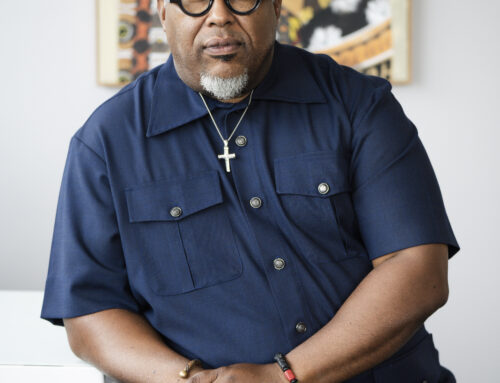
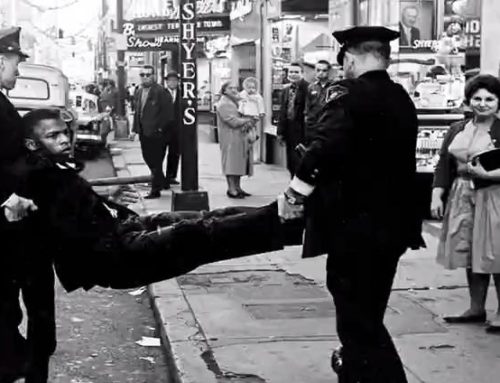
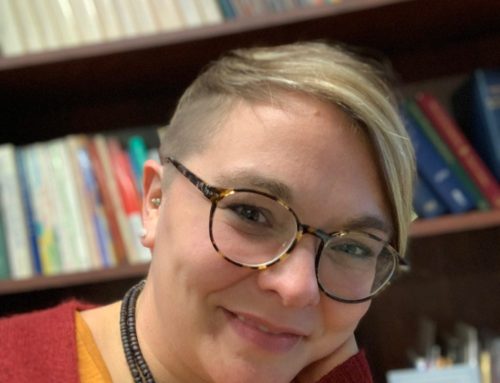
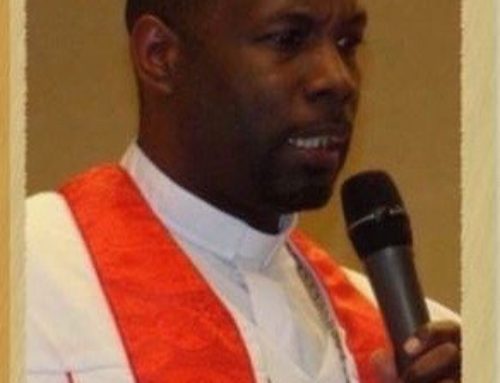
That first sentence draws you in deeper from the very start.